Are you constantly turning over every rock in search of that golden strategy to drive your business forward, yet feeling a bit skeptical about jumping on the referral program bandwagon?
It's understandableᅳafter all, you've poured your heart, sweat, and maybe even a few tears into building your brand, product, or service. The mere thought of relying on your existing customer base to drum up new business can seem like a leap of faith.
But what if I told you that by harnessing the power of referrals, you could unlock an unparalleled avenue for business growth that aligns perfectly with human nature's tendency to trust recommendations from friends and family over any advertisement? As they say, a customer who talks about their experience with you is worth ten times more than what you say about yourself.
This article will be your beacon through the decision fog, designed to illuminate the profound benefits that a well-crafted referral program can bring to your business. Stick with us, and by the end, you'll be more than ready to make an informed decision on whether setting up a referral program is the right move for your empire.
Referral programs are not just an add-on to your business strategy; they are engines of growth that propel customer acquisition in ways traditional marketing channels might only dream of.
At their core, referral programs leverage the most powerful marketing tool available—word of mouth.
When a satisfied customer tells their friends or colleagues about your product or service, it carries a weight no paid advertisement can match. This is because trust is already established through the personal relationship between the referrer and the referee.
For this reason, referral conversion rates are higher than conversion rates from other promotional strategies—whether they be from paid digital ads, social media ads, or offline marketing.
In today’s digital age, where consumers are bombarded with countless ads daily, personal recommendations cut through the noise like a hot knife through butter. It brings a human touch to your brand, making it more relatable.
This dynamic and engaging approach not only increases the likeliness of acquiring new customers but often attracts those who are already somewhat invested in what you have to offer, thanks to the endorsement from someone they know.
But here's the twist—referral programs do more than just bring in new people.
This loop fosters a community of brand advocates, amplifying your reach exponentially without the need for heavy ad spend.
Imagine walking into a party where you only know the host, but by the end of the night, you're in the middle of a laughter-filled conversation with a bunch of new friends. That's the kind of warm, welcoming vibe a referral program adds to your business.
It's not just about getting new faces through the door; it's about making them feel right at home, turning first-time visitors into regulars, and those regulars into part of the family. This is where the magic of customer loyalty begins.
You see, when someone refers their friend to your brand, it's more than a mere recommendation. It's them saying, "Hey, I trust these folks, and I think you will too." This trust is the golden ticket in today's market, where people are bombarded with endless choices.
Now, here’s a nugget of wisdom from the marketing world: According to a study by the Wharton School of Business, referred customers are 18% more likely to stick with a service or product than customers who stumbled upon a business through traditional marketing efforts. Think about that for a second.
That's a hefty chunk of loyalty you're gaining, simply by having a system in place that encourages your happy customers to spread the word.
But how does this translate into a win for your business, you ask? Well, loyal customers are like that friend who keeps bringing the best snacks to the party—they keep giving back.
They're more likely to make repeat purchases. In fact, six out of ten customers who are brand loyal do this. They're also often less sensitive to price changes, and they become champions of your brand, advocating for you in all their social circles (creating the endless cycle of referrals we previously discussed).
Customer loyalty is quantifiable, I might add, and that's by evaluating the Customer Lifetime Value (CLV). According to the same Wharton study we mentioned above, the CLV of referred clients are said to be 16% higher than that of those acquired from other means.
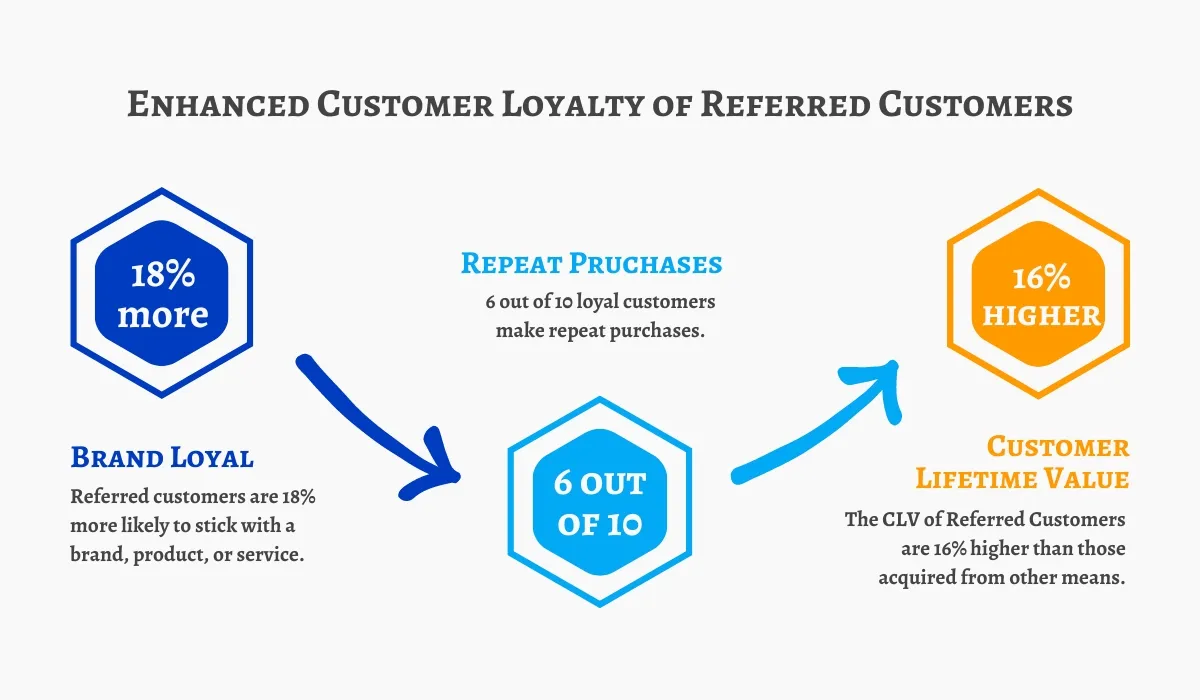
Why are referral programs the unsung heroes of cost-effective marketing? Well, it’s like choosing between hiring a skywriter to blast your message across the sky and simply relying on good old-fashioned word-of-mouth.
The former might grab some eyeballs but at a price tag that’ll make your accountant wince. The latter, however, harnesses the power of personal endorsements and relationships—priceless yet profoundly affordable. And that is how referrals can significantly reduce customer acquisition costs.
Referral Programs do come at a cost, including the incentive you'll be giving out and the promotion of the referral program itself. However, this is far less than you need as compared to other forms of marketing.
Think of the story of Dropbox, which took the concept of referral programs and ran with it, all the way to the bank. By offering extra storage space for every friend you referred, Dropbox turned its users into a bustling network of brand ambassadors. The result? A staggering 3900% growth, proving that the best things in life (and business) do indeed come free—or at least at a fraction of the cost of traditional ads.
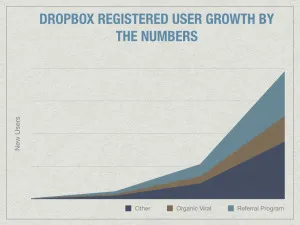
In an era where the prices for ad space on social media and other digital platforms are climbing swiftly, referral programs shine as a beacon of cost efficiency. Traditional marketing costs, including pay-per-click (PPC) advertising, social media ads, and other digital marketing efforts, can quickly deplete a business's marketing budget without guaranteeing a proportionate return on investment (ROI).
In essence, referral programs offer a solution to the pressing issue of rising marketing costs by fostering an environment where your existing customer base becomes a primary driver of growth, reducing the need to rely heavily on more expensive and less personal advertising tactics.
Referral programs aren’t just a cog in the marketing machine; they’re the golden ticket to acquiring higher-quality leads.
When we talk about “quality” in the context of leads, we’re referring to prospects who are not only more likely to convert into customers but also bring along a basket of benefits, including higher Average Order Values (AOV), greater lifetime value, and overall, more profitability for businesses. In essence, these are the dream customers every business yearns for.
Integrating a successful referral program contributes significantly to acquiring these higher quality leads, as it incentivizes existing customers to recommend the business, thereby ensuring the leads generated are more likely to have a higher conversion rate and loyalty.
Businesses leveraging referral programs also benefit from enhanced audience segmentation.
Since existing customers are likely to refer people with similar interests and needs, businesses can fine-tune their offerings and messaging to match this highly targeted audience. This not only improves conversion rates but also enhances customer satisfaction by delivering more personalized experiences.
Risk is a significant factor that businesses must consider when allocating resources to marketing efforts. With traditional forms of marketing, there's always the risk of not achieving the desired ROI or even worse, facing negative backlash from customers due to poorly executed campaigns.
Referral programs mitigate this risk by relying on trusted and happy customers who are more likely to produce positive word-of-mouth and, therefore, generate more positive leads. Plus, with the right referral marketing tools in place, businesses can monitor the success of their referral programs and make adjustments as needed, reducing the risk even further.
Referred customers also typically have a lower churn rate, reducing the risk associated with customer turnover. A lower churn rate implies that customers stick around for a longer period, contributing to a steady flow of revenue and reducing the need for constant acquisition efforts. This aspect is crucial for businesses aiming for long-term sustainability.
The stability and loyalty found in referred customers not only bolster a company's financial health but also create a loyal customer base that's more resilient to market changes and competition.
In the bustling marketplace of today, where every brand vies for attention, standing out from the crowd isn’t just an achievement—it’s a necessity. That’s where brand awareness enters the scene, not just as another marketing buzzword, but as the lifeline that keeps businesses afloat and thriving in a sea of competitors.
At its core, brand awareness is the extent to which consumers are familiar with the qualities or image of a particular brand's goods or services.
Brand awareness is the initial step in the customer funnel, serving as a crucial building block for enhancing brand equity. It plays a foundational role in the marketing puzzle, determining the recognizability and memorability of your brand among your target audience.
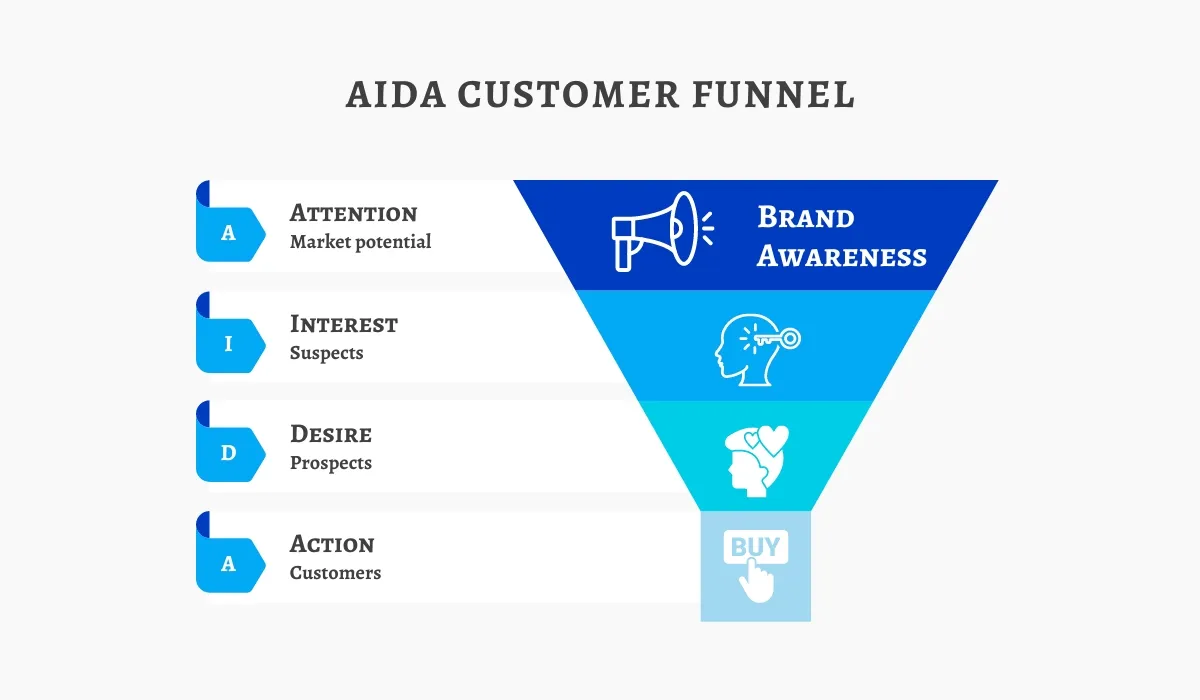
Imagine turbocharging this brand awareness through the power of word-of-mouth—enter your referral program. These programs are unique beasts in the marketing world, offering a blend of authenticity and personal recommendation that other strategies can hardly match.
But why do referral programs stand out in boosting brand awareness compared to other promotional strategies? The answer lies in their inherently social nature.
People love to share their experiences, especially when incentivized with rewards that add value to their interactions. This creates a ripple effect—each referral acts like a personal endorsement, not just increasing visibility but also enhancing the brand's reputation and credibility.
Building your brand’s credibility is akin to constructing a bridge that connects your business to potential customers through a foundation of trust and reliability. When a brand is deemed credible, it signals to consumers that your products or services are of a consistently high quality, that your business operates with integrity, and that consumer satisfaction is a top priority. This standing in the minds of consumers can be a significant differentiator in crowded markets.
Recommendations from friends or family members serve as personal testimonials to the quality and reliability of your brand. Such referrals carry immense weight as they come from a trusted source, rather than through what we always think of as "biased" advertising channels. Of course, they'll say good things about themselves in an ad—they're the ones saying it! But when it's someone you know who's saying it, then you will likely believe them.
This is because the recommendation, at its core, is rooted in an authentic user experience rather than a corporate sales pitch.
Take Uber, for example, which faced skepticism initially because the concept of sharing rides with strangers was new and often thought of as risky. It sounded like the start of a horror movie, right? But then, those brave souls who gave it a shot couldn’t stop raving about it.
It was like, “Hey, I tried this, and not only did I survive, but I actually loved it!” Their thumbs-up was all the proof Uber needed to skyrocket from “What’s that?” to “Where have you been all my life?”
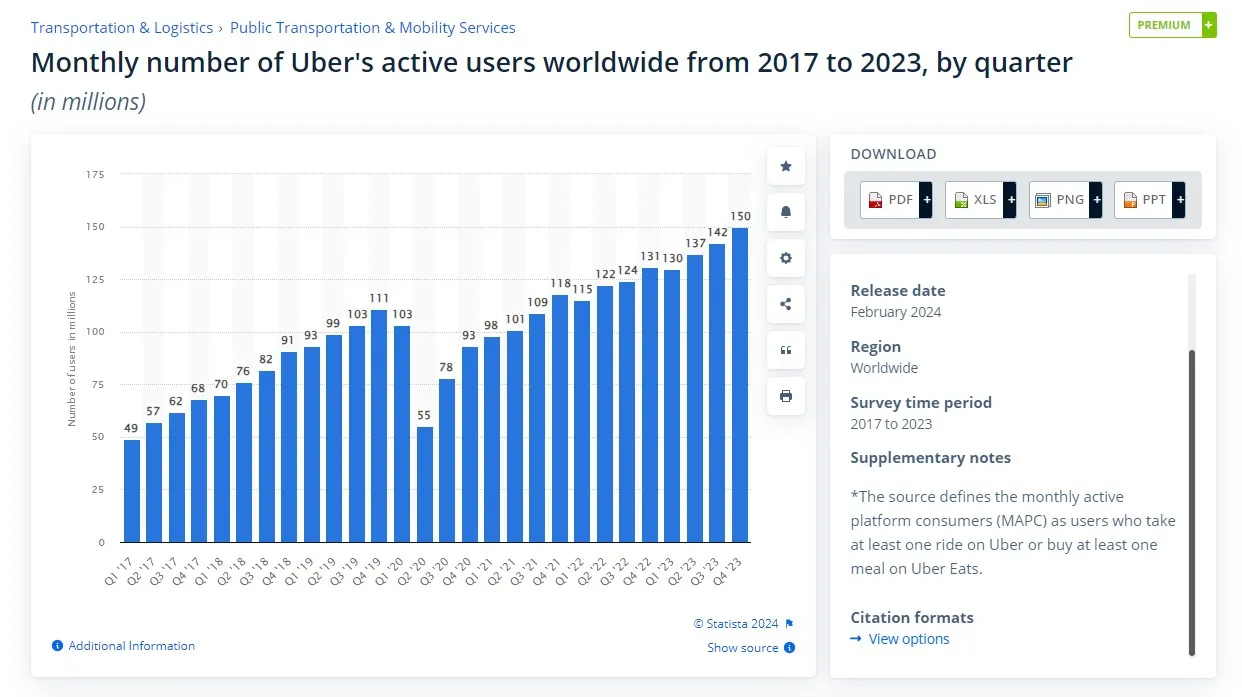
This wasn’t just growth; it was growth on steroids. And just like that, Uber didn’t just get a pat on the back for being reliable; it became the poster child for how awesome sharing rides can be.
Reaching your target market in today’s oversaturated digital landscape can often feel like an exercise in futility. Despite the advanced targeting capabilities offered by modern advertising platforms—where you can pinpoint demographics, interests, locations, and even behaviors—capturing the genuine attention of your intended audience remains a daunting challenge.
The core of the issue lies in the impersonal nature of these ads; no matter how specific your filters are, they can’t replicate the authenticity and trustworthiness of a personal recommendation.
Referral programs harness the power of personal connections, tapping into the networks of your existing customers who understand the unique preferences and needs of their friends, family, and colleagues. By enabling these customers to refer friends, the referral program effectively reaches targeted audiences through the most trusted form of marketing: word-of-mouth recommendations from happy customers.
People who like your product or service are great at finding others who will, too. Referrals work so well because they’re not random; they’re chosen with care.
They know the people within their network well. So, instead of trying to get everyone’s attention, a happy customer will think of specific friends who would really enjoy or benefit from what you’re offering.
This means you’re not just reaching more people, but the right ones. Each person recommended is likely to be interested because the person who referred them knows what they like and need, which is way more effective than any advertisement.
Referral programs are like secret weapons that help businesses smash through their target market boundaries and find profitable niches they never even thought about before.
It's not just about snagging new customers; it's about stumbling upon whole new groups of people who need what the business offers in ways nobody expected.
A quintessential example of this phenomenon is Slack, which was created with a specific user base in mind—video game developers. Initially, the creators of Slack did not envision the broad applicability of their product across different industries.
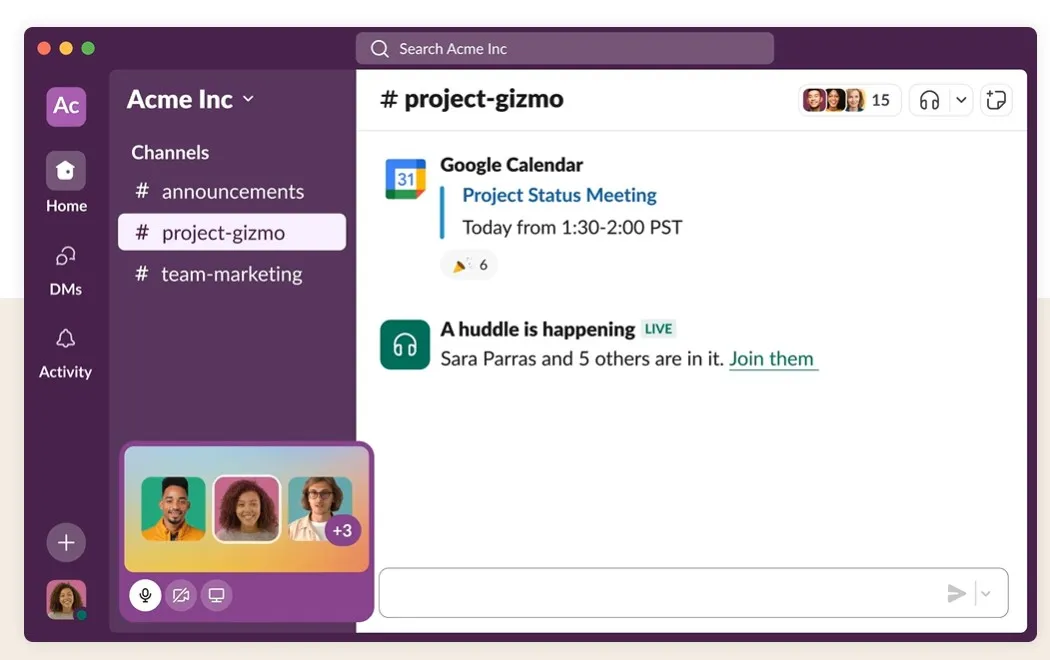
However, as users began to share their positive experiences with peers from other sectors, Slack's utility as a versatile team communication tool came to light. This organic growth trajectory propelled by user referrals enabled Slack to identify and capitalize on profitable market segments beyond their original scope.
And we all know Slack right now as a vital communication tools for teams and projects, with improved features that cater to this now widened market segment.
Oh, and did you know that Slack's promotional strategy centered upon its awesome referral program?
Here’s the thing about referral programs: they add this unique flavor to the customer experience that’s both dynamic and engaging. By inviting customers to share their love for your products or services and incentivizing customers with rewards such as coupons, discounts, promo codes, and points, you’re essentially giving them a stake in your brand’s growth.
It’s like telling them, “Hey, you’re part of the family. Help us grow.” This inclusion fosters a sense of belonging and loyalty that money can’t buy. By leveraging technology to track these referrals, businesses can effectively encourage existing customers to recommend their brand, fostering engagement, growing the customer base, and creating brand loyalty.
Ever heard of FOMO (Fear of Missing Out)? It's this powerful motivator that gets people to take action because no one likes to feel left out.
Referral programs cleverly tap into this phenomenon. When customers see friends or family benefiting from your brand—maybe getting discounts or special perks for referring others—they're hit with a wave of FOMO.
They think, "I want in on that too!" And just like that, you've got a recipe for high conversion rates.
People don't just want to join in; they feel they need to, so they don't miss out on the benefits their peers are enjoying.
This mix of community building and leveraging FOMO makes referral programs incredibly effective. When you turn transactions into connections and customers into passionate advocates, you're doing more than growing your customer base—you're cultivating a thriving community.
Referral programs aren't just awesome for getting new customers and building a community; they're also treasure troves of customer data and insights that can really make a difference in how a business grows and strategizes.
Businesses can get a much better idea of what their market wants, tweak their products or services, and adjust their marketing tactics to hit the mark. They can do these when they dive into the behaviors, likes, and feedback of customers who take part in the referral program.
Here’s how referral programs deliver these insights:
Referral programs naturally spotlight your most enthusiastic customers—those who are willing to advocate for your brand.
Tracking your top-referring customers is like finding out who's throwing the most epic party in your brand's honor. Get to know these VIP influencers, their likes, and behaviors, and you can tailor your marketing campaigns to attract the whole crowd.
The success rate of referrals is a direct reflection of customer satisfaction.
A high referral rate indicates that customers are happy with your product or service, while a low rate may signal areas for improvement. Monitoring referral activities allows businesses to gauge overall customer satisfaction and loyalty, identifying what they’re doing right and what needs to be enhanced.
When it comes to anticipating whether a customer will refer your company to others, the Net Promoter Score (NPS) acts as a significant indicator.
Essentially, NPS gauges the likelihood of your customers recommending your brand based on their experiences. A simple survey asking, "On a scale of 0 to 10, how likely are you to recommend our company to a friend or colleague?" provides you with a score that categorizes your customers into promoters, passives, and detractors.
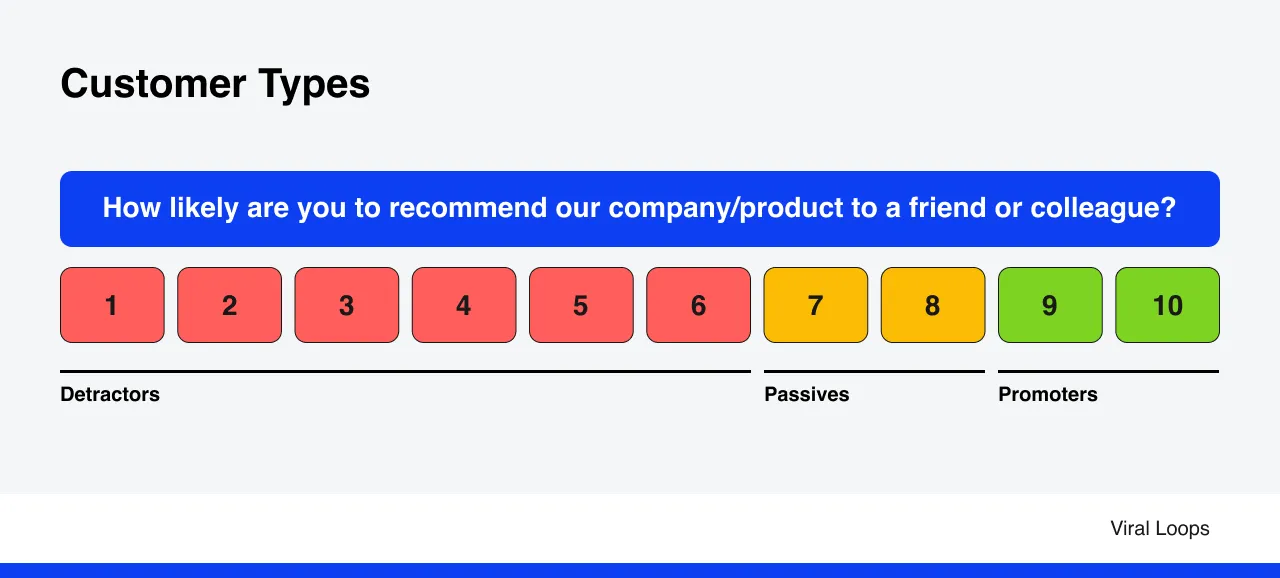
While NPS offers a predictive glance at potential referral behavior, it's the actual referral rate that brings this prediction to life.
The transition from a customer being a 'promoter' in your NPS survey to taking that definitive action of referring your company is the tangible evidence you need to gauge customer satisfaction.
Referral programs often encourage communication between existing customers and potential ones. This exchange can provide businesses with honest feedback on their products or services.
Additionally, businesses might gather data through referral program surveys or feedback mechanisms, which can reveal how both referrers and referees perceive the product’s value and usability.
Referral programs inherently generate social proof, as satisfied customers recommend the brand to their peers. Analyzing which aspects of the product or service are most frequently highlighted in referrals can inform businesses about their strongest selling points. This allows them to leverage these insights in broader marketing campaigns to attract a wider audience.
The beauty of a referral program lies in its flexibility; it can be customized to fit the unique needs and preferences of any target audience, regardless of the sector.
Whether it's tech, retail, healthcare, education, service industries, or events—a referral program can be shaped and molded to ensure it resonates with customers and incentivizes them to spread the word about your brand.
For instance, a tech company might offer discounts on future subscriptions, while a retailer could give store credits for each successful referral. The key is to understand what motivates your existing customers and what will entice potential customers.
Whether you're just starting out or managing a vast enterprise, referral programs can adjust to fit your growth trajectory like a glove.
Your referral program can expand alongside your business, without losing its personal touch or effectiveness.
At the heart of a scalable referral program is smart automation.
Imagine a system that automatically sends out referral invites or rewards based on specific customer actions or milestones.
This kind of setup means that whether you have 100 customers or 100,000, each one gets a timely, personalized experience without draining your resources.
Referral program software like Viral Loops can track referrals, automate reward distribution, and provide analytics, all of which allow you to free up your team, so you can focus on big-picture strategies.
Now, consider the adaptability of rewards. A startup might begin by offering simple discounts or exclusive content as rewards for customer referrals.
But as it grows, the rewards can evolve into more substantial offerings like premium services, larger discounts, or even physical gifts.
The scalability of referral programs ensures that your rewards can grow in value and variety as your business and budget expand.
It's not just the rewards that blossom with your business; the number of advocating customers can skyrocket, too.
The true beauty of a well-structured referral program is its ability to adapt to and thrive alongside your expanding customer base.
No matter if you're a cozy boutique shop, a bustling online platform, or a rapidly blossoming startup, your referral program can seamlessly scale to match your pace of growth.
Here is the kicker: as your business grows, so does the pool of potential advocates.
This exponential potential for growth means that your referral program could transform from a small networking effort into a vast web of interconnected customers, all thanks to the scalable nature of your strategy.
Of course, you can also tone it down as necessary. If you can no longer keep up with the demand or certain lead times are necessary, you can adjust your referral marketing program to be manageable for your business.
This is a benefit of referral programs that often fly under the radar but are incredibly potent: they create additional touchpoints with the referrer through referral rewards.
This advantage is like the gentle ripple effect caused by a single pebble thrown into a pond. The initial action—a share on social media, a mention in a conversation—sets off a series of interactions that reach far beyond the initial splash.
Every time a referrer receives a notification that their referral has led to a new customer or when they are rewarded for their efforts with referral rewards, it’s not just a pat on the back; it’s a gentle reminder of the brand’s presence and value in their lives.
This moment is akin to hearing your favorite song on the radio out of the blue; it brings the brand back to the forefront of the customer’s mind, encouraging them to engage once more.
It acts as a subtle yet effective retention tool, keeping the brand fresh in the minds of existing customers.
Have you ever poured your heart and soul into crafting the perfect banner or search ads, only to find they're vanishing into the abyss of ad blockers?
In today's digital landscape, where ad blocking is not just common but expected, traditional advertising methods are hitting a significant roadblock. This is where the genius of referral programs really shines through—they are inherently adblock-proof.
Referral programs bypass the traditional ad delivery systems entirely. Instead of relying on potentially blocked ads, your message is carried directly from your customers to their networks.
This peer-to-peer sharing isn’t just more personal and trusted; it’s completely immune to the barriers and filters that plague other digital marketing strategies. Your customers become your most effective and unstoppable marketers, spreading the word about your product or service without any interference from ad-blocking technology.
Viral growth refers to the exponential expansion of a company’s customer base, much like a virus spreads from person to person. This sharing leads to a chain reaction, leading to an exponential increase in clientele.
Referral programs are instrumental in harnessing the power of viral marketing for businesses by strategically tapping into networks of trust and communication among consumers.
Each participant in the program becomes a node in a vast network, capable of transmitting a brand’s message to numerous contacts.
This multiplication effect is similar to the spread of information across social networks, where each share has the potential to reach an exponential number of new individuals.
Moreover, referred customers often remain loyal customers, contributing significantly to the sustainable growth of the business.
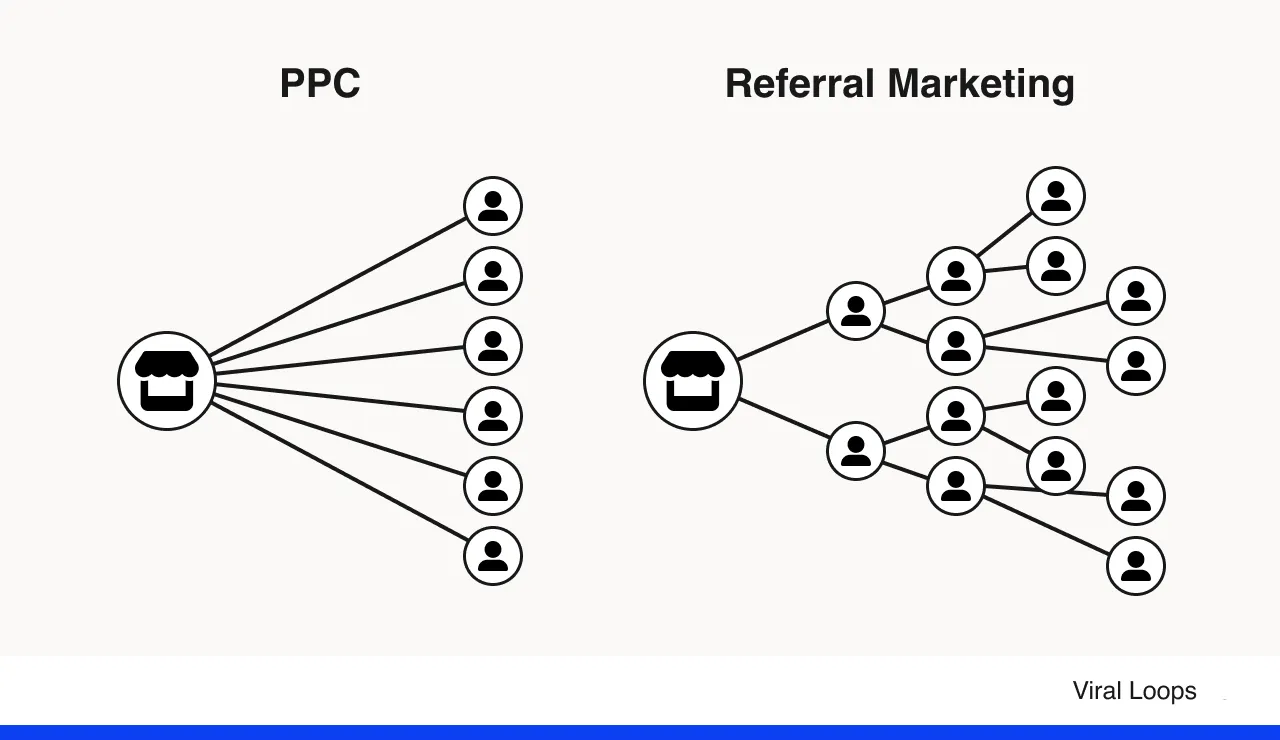
The customer buying process traditionally involves several key stages:
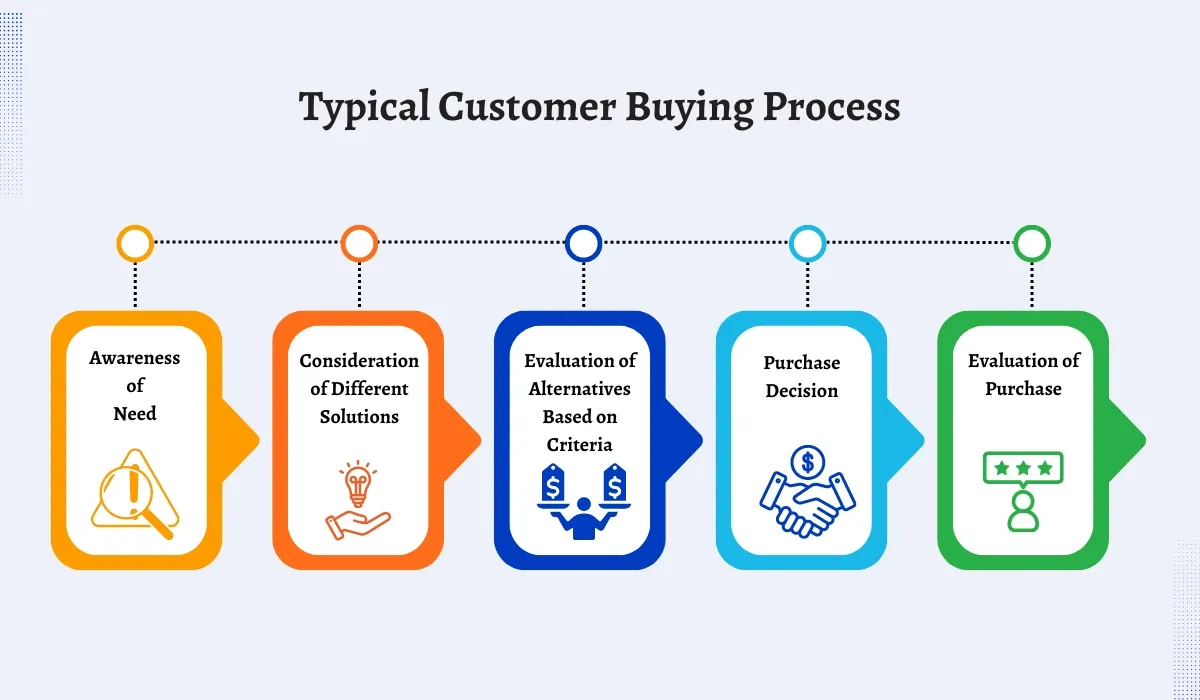
Throughout this journey, potential customers invest significant time in researching and comparing options, reading reviews, and seeking recommendations to ensure they make an informed choice. This cycle can be extensive, as consumers seek to minimize risk and maximize value for their investment.
In the typical scenario, you would have to spend on ads to keep your customers coming back to you. You need to keep reminding them that you are the best option, and you must also do so at the right time! It's costly and requires a lot of effort.
Referral programs, however, can significantly compress this sales cycle.
When a current customer refers a friend or peer, the referred individual often bypasses multiple early stages of the typical buying process.
Instead of spending time and effort on researching the business or product, a referred customer tends to rely heavily on the word-of-mouth recommendation. This trusted endorsement effectively removes doubt, diminishes the perceived risk, and substantially reduces the need for further validation.
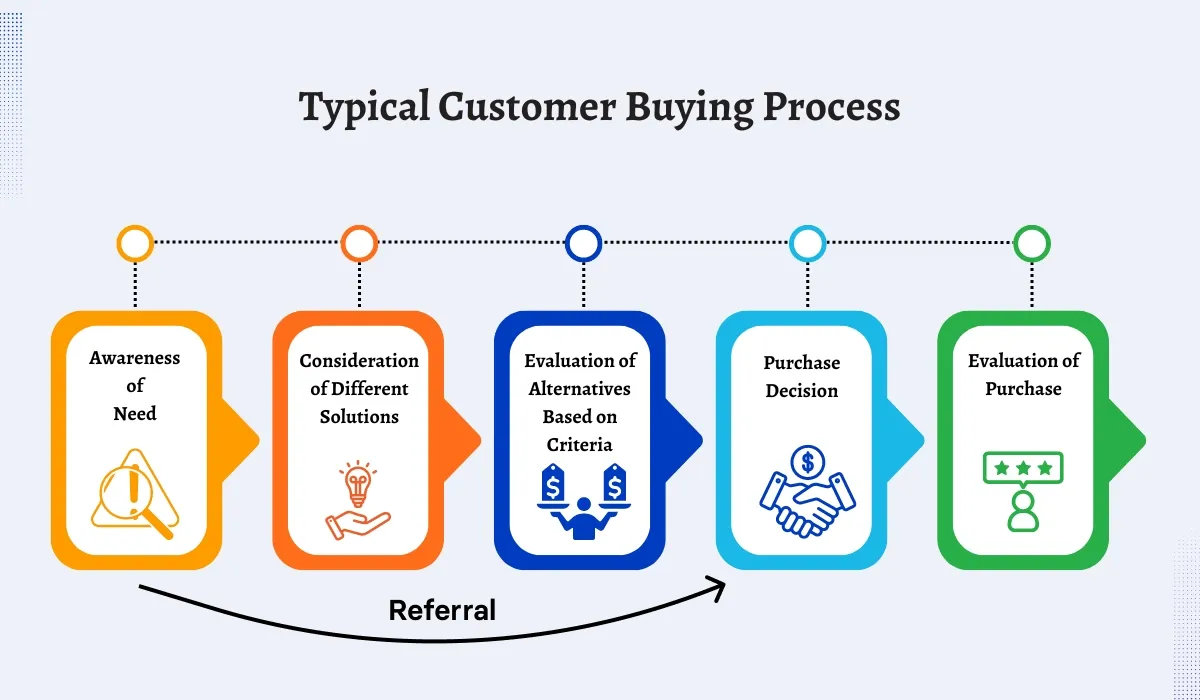
Consequently, referred customers are more likely to proceed directly to the purchase phase, confident in the value and quality of their decision, all thanks to the powerful, trust-building impact of a personal referral. This not only hastens the sales cycle but also enhances the efficiency of customer acquisition efforts.
Now all kinds of businesses can receive the benefits of a referral program as listed above, but there are also a few advantages that are applicable to certain industries.
Let's enumerate some of them.
In conclusion, referral marketing emerges as the unsung hero of many a marketing strategy, bridging gaps with its unique approach to customer acquisition and engagement.
With its raft of advantages—from speeding up the sales cycle to deepening customer trust and loyalty—it's hard to find a reason not to incorporate referral marketing into your plan. This strategy stands out not only for its effectiveness but also for the minimal disadvantages and costs associated with its implementation.
Whether you're aiming to increase sales, improve product adoption, or just want to build stronger relationships with your customers, referral marketing offers a low-risk, high-reward solution. It's time to take the plunge and integrate this powerful strategy into your marketing arsenal. Jump on in—the rewards are waiting!